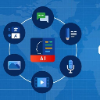Comprehensive clinical documentation is crucial for effective healthcare delivery, yet it poses a significant burden on healthcare professionals, leading to burnout, increased medical errors, and compromised patient safety. This paper explores the potential of generative AI (Artificial Intelligence) to streamline the clinical documentation process, specifically focusing on generating SOAP (Subjective, Objective, Assessment, Plan) and BIRP (Behavior, Intervention, Response, Plan) notes. We present a case study demonstrating the application of natural language processing (NLP) and automatic speech recognition (ASR) technologies to transcribe patient-clinician interactions, coupled with advanced prompting techniques to generate draft clinical notes using large language models (LLMs). The study highlights the benefits of this approach, including time savings, improved documentation quality, and enhanced patient-centered care. Additionally, we discuss ethical considerations, such as maintaining patient confidentiality and addressing model biases, underscoring the need for responsible deployment of generative AI in healthcare settings. The findings suggest that generative AI has the potential to revolutionize clinical documentation practices, alleviating administrative burdens and enabling healthcare professionals to focus more on direct patient care.
翻译:暂无翻译





